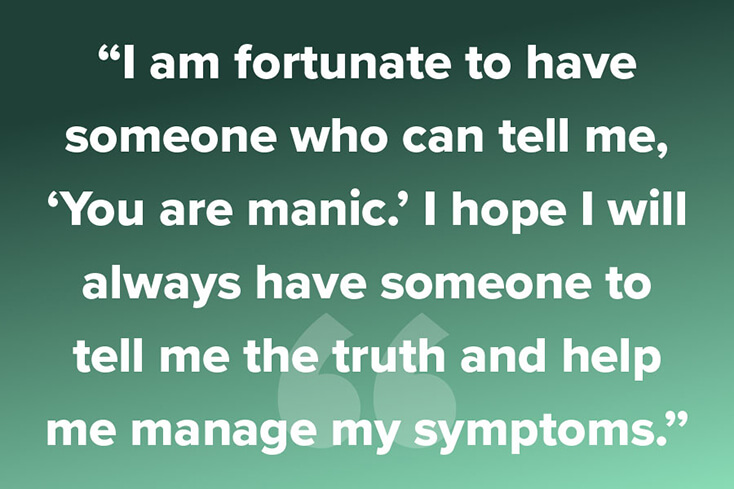October 21, 2021
By Natalie Withrow

After I displayed some erratic behavior throughout my childhood, my parents grew concerned about me, and scheduled an appointment with a psychiatrist. At 18 years old, I was diagnosed with bipolar disorder. The practitioner, who I still see today, prescribed medication that prevented frequent manic or depressive episodes. However, managing my mental health condition is a lifelong journey.
Throughout this journey, I’ve learned that you need to prioritize having a good treatment team, cultivating honest friendships and practicing self-care and acceptance.
My story is not without its setbacks. Recently, I had an ectopic pregnancy, followed by a major surgery to remove my gallbladder and appendix one week later. This series of traumatic events triggered a manic episode. During these episodes, the mania takes over my brain, and often, there is nothing I can do to stop it.
I found myself posting on social media every day and becoming obsessed with making TikTok videos back-to-back (which is normal behavior for some people, but certainly out of character for me). I began calling and texting various contacts and sharing overly personal information. I wanted to take apart my sectional couch and rearrange it in the living room — although I never completed this task because another fleeting thought came to me. I wanted to start my own Etsy shop, even though I have a full-time job as an operating room nurse.
Luckily, a friend picked up on these concerning behaviors and told me that I was manic. She showed me a text I sent her, and I was shocked. I do not remember sending the message at all, and in a better state of mind, I would never say the things I sent her. I am fortunate to have someone who can tell me, “Natalie, this isn’t you. You are manic.” I hope I will always have someone to tell me the truth and help me manage my symptoms.
Addressing the consequences of a manic episode can be emotionally draining. In the aftermath, I need to check my bank account to see if I made any financial decisions. I also need to acknowledge and address my fears of having another manic attack episode.
When dealing with a setback, I’ve learned I have to rest, but also find productive ways to keep myself occupied. I need to accept that a chemical imbalance is not my fault and be grateful for the support I have when these episodes take place.
Ultimately, I hope my story can help anyone experience something similar. If these behaviors are familiar to you, seek out a psychiatrist for evaluation or guidance. And if you notice that a loved one behaving out of character, check on them. Self-advocacy and support can be life-changing.
Submit To The NAMI Blog
We’re always accepting submissions to the NAMI Blog! We feature the latest research, stories of recovery, ways to end stigma and strategies for living well with mental illness. Most importantly: We feature your voices.
LEARN MORE